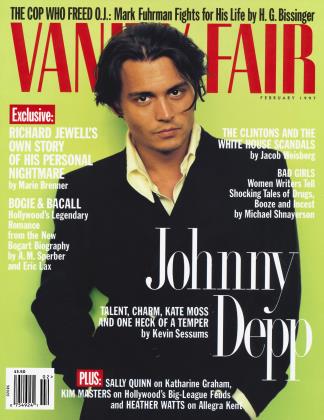Sign In to Your Account
Subscribers have complete access to the archive.
Sign In Not a Subscriber?Join NowKATHARINE THE GREAT
Katharine Graham, legendary publisher of The Washington Post, goes to press with her long-awaited autobiography this month. SALLY QUINN knows why Kay is special
SALLY QUINN
error. Sheer terror. That is the only way to describe my feelings as I drove to Katharine Graham's house that night to lobby her not to go to the Gridiron dinner. The Gridiron was an all-male journalists' club in Washington which held an annual dinner for the powers that be—also male, of course. In 1972, feeling some flak from feminists, they invited a few token female guests. Kay, as publisher of The Washington Post, was among them. She was often, to her embarrassment, called one of the most powerful women in the world; it was she who had O.K.'d the Post's 1971 publication of the Pentagon Papers, at the risk of going to jail, and she would soon preside over the story that drove Richard Nixon from office. But when a group of women at the Post wrote her a letter asking her not to be one of the Gridiron's tokens, she invited us over to discuss it. What I expected to find was Mrs. Pynchon from the Lou Grant show: aloof and scary. What I found was someone funny, smart, iconoclastic, and sympathetic. I remember thinking as I left that I would like to have her as my friend. She decided not to attend the dinner, but her curiosity got to her. So while the Post women picketed the arriving guests outside the Statler Hotel, Kay was hunkered down on the floor of an old Mustang, circling the block and peeking out to see how things were going.
A year and a half later, in the middle of Watergate, I began seeing Ben Bradlee, then editor of the Post. Though I had left the paper to anchor the CBS Morning News in New York, the Washington establishment didn't know quite how to react to us as a couple, and we were not asked anywhere. That changed on December 7, Pearl Harbor Day, when I went down for a dinner party at Kay's. You can't imagine how people fell all over us. Knowing that we were being frozen out, Kay had given us the seal of approval, and from then on we were besieged with invitations. She was my matron of honor when Ben and I got married, and I will never forget the sight of Katharine Graham arriving for the ceremony clutching an exquisite bouquet of white flowers which she had had made for me in New York that morning and carried down herself, by hand, ribbons streaming, on the Eastern Shuttle.
After I finally got pregnant, as I lumbered past my due date, Kay called to commiserate almost every day for three weeks; she had been in the same boat and knew the anxiety I was feeling. That anxiety, however, was nothing compared with what Ben and I went through when we learned that our baby, Quinn, needed surgery. It was Kay who showed up at Children's Hospital and kept us company until word came that the operation was a success.
Whenever Ben is around Kay and someone compliments her in any way, Ben makes this awful kissing noise to imply that the person is sucking up. This is usually greeted with a red face and embarrassment by the sucker, and uproarious laughter and an "Oh, Ben, really" by Kay. Well, Ben, pucker up. Kay's autobiography, Personal History, is affecting, intelligent, beautifully written, and riveting. She is unflinchingly candid about her distant relationship with her mother, her struggle with a manicdepressive husband who eventually took his own life, her fears about assuming control of the Post after he died, her friendship with one of the richest men in the world, Warren Buffett, and her insecurities about herself as a woman. "The more subtle inheritance of my strange childhood," she writes, "was the feeling, which we all shared to some extent, of believing we were never quite going about things correctly." All I can say is, by me she has always done the right thing. I feel lucky that she actually did become my friend.
 View Full Issue
View Full Issue












Subscribers have complete access to the archive.
Sign In Not a Subscriber?Join Now